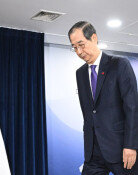Declassified Documents Unveil CIA Blunders in Korean War
Declassified Documents Unveil CIA Blunders in Korean War
Posted June. 21, 2010 12:51,
Unable to block North Korean soldiers who moved southward after the outbreak of the Korean War, U.N. and South Korean armed forces held the final line of defense in Busan.
The U.S. Central Intelligence Agency presented in August 1950 a report that reviewed the scenario of U.N. forces advancing toward the demarcation line dividing Korea. This was before the Incheon landing on Sept. 15 that year, but the CIA analyzed the pros and cons of occupying North Korea by U.N. forces as if forecasting the massive offensive by U.N. and South Korean forces.
This was included in 1,300 documents the CIA declassified at a seminar to celebrate the 60th anniversary of the war`s outbreak at the Harry S. Truman Library and Museum in Independence, Missouri Wednesday. The documents include secret memos containing CIA analyses and prospects of the war.
A three-page secret document titled The Impact of the U.N. Forces Occupation of the Entire Korean Peninsula drawn up Aug. 22, 1950, said that if U.N. forces turned the tide of the war and advanced north of the 38th parallel, the victory would bring a decisive diplomatic defeat to the Soviet Union and raise the standing of the U.N. and U.S.
In addition, the document said the offensive would prevent communist forces from expanding their influence on the Korean Peninsula, which could be used as a buffer to cushion the impact of clashes between communist and liberal forces.
The CIA, however, concluded that marching north was impossible mainly because of the low probability of the U.S. getting U.N. approval. The deployment of U.N. forces was to expel North Korean troops from South Korea, not to occupy the North.
Risking war with China was another reason to drop the plan. The Soviet Union, who secretly wanted a military conflict between the U.S. and China, is known to have welcomed such a situation. The CIA also did not hide its fear of an all-out war between the U.S. and the Soviet Union.
Lastly, the CIA concluded that the possibility of a military attack on North Korea would cause constant instability on the peninsula. If the North was occupied, the Soviet Union would likely have launched military provocations to cause U.S. forces, which were withdrawn from South Korea in 1949, to be stationed on the peninsula for a long time.
Another report on the CIAs self-reflection also unveiled the intelligence agency`s critical misjudgment of a North Korean invasion of South Korea and Chinas involvement in the war. Drawn up Sept. 8, 1950, it said, There is no direct evidence showing Chinas involvement in the war.
When the tide turned on the North after the Incheon landing, the CIA ruled out the possibility of Chinese involvement since Beijing gave no signs to that effect. The CIA declared Oct. 12 that year that Chinese forces would not join the war and said in a report that from a military perspective, the best time for Chinas involvement had passed.
Based on such intelligence, Gen. Douglas MacArthur, head of the U.N. Command, said in talks with U.S. President Harry Truman Oct. 15 that the war would end by Christmas. Four days later, however, some 30,000 Chinese forces crossed the Duman River and another 150,000 joined the Korean War several days later.
triplets@donga.com







